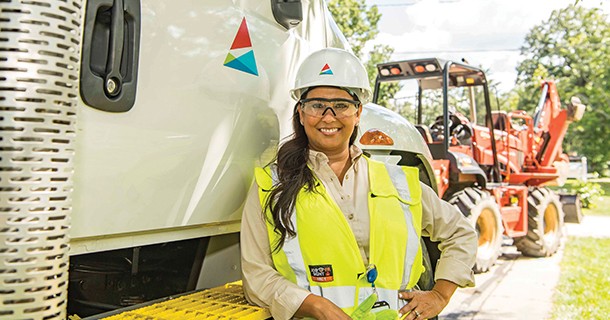Virginia Natural Gas shares home safety tips for winter weather
VIRGINIA BEACH, Va. – Dec. 1, 2022 – When the days are shorter, more time is often spent indoors where home heating, holiday decorations, winter storms and candles can contribute to increased risks during the cold weather months. However, according to the National Fire Protection Association (NFPA), half of home fires occur December through February.
Virginia Natural Gas wants to offer some winter safety tips for homeowners since ensuring the safety of every customer and the community we serve is the company’s highest priority.
Holiday Safety
Holidays are a time for celebration with family and friends. Decorations make the occasion festive, and from parties to potlucks, food makes the event delicious. By following a few simple safety tips, you can enjoy time with your loved ones and keep yourself and your family safe.
- The leading cause of kitchen fires is unattended cooking, according to the NFPA. Prevent fires by making sure your oven and stovetop are clean and free of grease and dust. Always have a cook in the kitchen when appliances are in use.
- Lights are among some of the best parts of holiday decorating, but make sure there are no exposed or frayed wires, loose connections, and don’t overload sockets. Use clips to hang lights, not nails, so cords do not get damaged. Ensure timers are turning interior and exterior lights on and off at appropriate times.
- Never leave a burning candle unattended. Avoid using candles if possible and consider using battery-operated ones instead.
- Shop during daylight hours if you can, and if it’s dark out, park in a well-lit area and stay alert to your surroundings. Make sure all doors are locked and any packages or valuables are stowed in the trunk or placed out of sight.
- Don’t share your travel plans, or when your home will be empty. Wait until you return to post those vacation photos on social media. Ask a trusted neighbor, family member or friend to check in on your home while away.
- Designate a sober driver or arrange for a cab ahead of time if you plan to drink at holiday gatherings.
Winter Safety
It’s not common, however, if we experience a winter storm, heavy snow and ice may weigh down power lines and tree limbs, causing them to fall. If a natural gas meter is damaged or a gas line is exposed, immediately leave the area and call the 24-hour emergency response line, at 877.572.3342 from a safe location.
- Keep meters clear of snow and ice, and any debris from the storm.
- Use a broom to move any snow away from the meter; avoid using a shovel or snow blower.
- Check outdoor vent openings and air intakes to ensure appliances are not obstructed by snow, ice or other debris.
- Customers should never use natural gas appliances, such as burners on a stove or ovens, to heat their homes or businesses.
Fire and Carbon Monoxide (CO) Safety
Unlike natural gas’ distinct odor, carbon monoxide is an odorless gas that is created when fuels such as gasoline, wood, coal, propane, methane or oil do not burn properly. In the home, heating and cooking equipment that burn fuel are potential sources of carbon monoxide, as are vehicles or generators running in an attached garage. If you smell natural gas or suspect carbon monoxide is present in your home or business, you should immediately leave the area and call 911 from a safe location.
- Make it a semiannual habit to change smoke and CO detector batteries. The Consumer Product Safety Commission recommends that consumers change the batteries when they change the clocks for daylight saving time.
- Install a CO detector near all bedrooms in the house; do not install a detector near your kitchen, garage or in a room with a furnace.
- Possible symptoms of CO poisoning include headache, dizziness, fatigue, nausea and vomiting; anyone experiencing these symptoms are encouraged to seek immediate medical attention.
- Generators can be useful after a storm but dangerous if not properly used. The primary hazards to avoid when using a generator are CO poisoning from the toxic engine exhaust, electric shock or electrocution and fire. NEVER use a generator in enclosed or partially enclosed spaces.
- Clean smoke detectors of dust and cobwebs to ensure proper function.
- Have a fire escape plan for your family in case of a fire. Walk through your home and inspect all possible exits and escape routes.
Learn more safety tips by visiting virginianaturalgas.com/safety.
About Virginia Natural Gas
About Southern Company Gas
Media Contact:
Rick DelaHaya
o: 757.616.7510 | c: 757.323.7366
rdelahay@southernco.com | www.virginianaturalgas/pressroom


